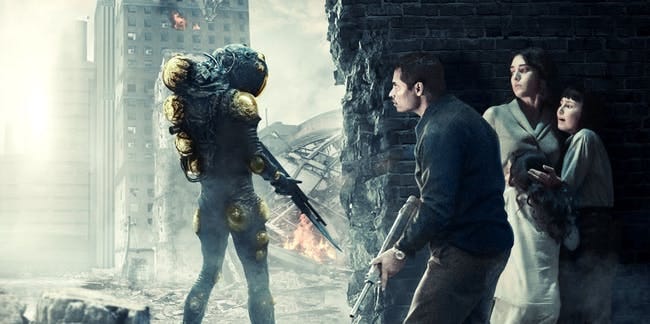
The critics did not enjoy this film. After finishing Extinction, I went ahead and looked it up — as I do with all films I enjoy — and discovered that the reception was decidedly not what I expected. For my part, the hour and a half spent watching Extinction was a thrill, one which reminded me of the very best of the 90s-style action sci-fi, but which managed to go farther than a lot of those classics in terms of emotional intimacy and narrative depth.
However, upon reading some of the critical responses to this film, I found myself increasingly annoyed. Mind, I’ve written some unfavorable reviews myself in the past, but something about the way critics treated this film bothered me. Was it simply their usual acerbic tone? Film critics can often be some of the most annoying people when they set their mind to it. But, no, that was not the problem.
The problem, to my mind, is that the film was actually good. At the very least, I would classify it as a genuinely enjoyable lower-budget film, one which rewards sci-fi fans with a dose of thoughtfulness in the screenplay that simply isn’t the norm in most major science fiction films these days.
As with most of my reviews, there are spoilers ahead, so I suggest watching the film for yourself before you read on.
Note that I do try to minimize the spoilers, but you’ll probably find it all much more enjoyable if you finish reading this review after you’ve watched the movie for yourself. I hope you’ll return here when you have, I’m looking forward to some conversations regarding it later in the week.
Peter is a man on the edge. Dreams have been invading his sleep, causing friction for his whole family — even David, his boss, and his friends are worried about him. We enter with the sense that we are in the final days of a predictable domestic breakdown. Peter refuses to go seek help because he doesn’t want them to think he’s insane, his wife is scared and angry because her husband is losing his mind, and his daughters are starting to feel like their dad doesn’t care about them. Clearly, Peter does care, we see enough of him to know that what’s happening to him is eating him up inside, but we can also see that his dreams are more than the night terrors of an overworked man.
We have the feeling that there is something larger going on in this strange, murky world…
One of the things which struck me was the way the first part of the film was paced, and how much of the constructed world was hinted at through visual cues. The audience is left to make its own inferences, but it seems clear that the film is set some distance in the future. The idealized futuristic cityscape, with its curving eco-towers, suggests this, as does the quiet mundanity of the characters’ lives. I wanted to see more of this slightly muted world and found myself longing to go “see the pier” almost as much as Peter’s kids.
In this opening third of the film, it’s easy to get sucked in. Michael Peña’s acting as Peter is as excellent as always, as is that of Lizzy Caplan, who plays Alice, his wife. Peter is a likable fellow and pitiable one, and Caplan plays the part of Alice without the venom we expect from her stereotypical role as “angry wife.” All the while, however, we are also introduced to a subtle unease — and not just because of Peter’s dreams. We have the feeling that there is something larger going on in this strange, murky world, and we only stop waiting for the other shoe to drop when, instead, fireballs rain from the heavens.
But I’m getting ahead of myself. Before we jump into the action-oriented 2nd third of the film, I want to bring up my favorite scene from the pre-invasion story.
Peter falls prey to one of his prophetic visions and collapses on the floor, presumably somewhere in the mostly-empty government building where he works. When he wakes, he realizes that he has missed the special evening he had planned with his family — intended to be a salve for his unstable behavior (which, we can gather, has been happening for quite some time). Peter runs off toward his apartment building, desperate to reach his family and apologize. But, on the way there, he looks up at the sky and sees something.
“Hey! Do you see that light?”
He grabs a passerby and points, asking the man if he notices anything. For just a moment, we see three points of light splitting apart in the heavens. The man, however, ignores him. peter looks around in helpless disbelief as not a single person on the busy evening street appears to pay attention to him or notice the strange happenings in the sky above. For a moment, he seems defeated, but then across the street, he spots something. The window of a shop. Behind the painted gold name “City Antiques” there is a telescope glowing under a display lamp. Off to one side are a number of map globes. Indeed, there is something about the collection of antiques which further suggests a sense of oddity about the world we’ve come to know Peter in — it is as if gathered in the window are all the pieces of a world we, the viewer, know well. There is a suggestion too, hinted by the apathy of the passerby toward the sky and the centerpiece telescope, of something about the nature of this society: a sense that looking to the stars is not even a mildly common activity anymore. Of course, we also know that Peter plans to use the telescope to look for his mysterious lights in the sky.

Assuming that you have, indeed, watched the film already and don’t need a point-by-point recap, let’s jump far ahead now to the main reveal of Extinction.
The short of the long? Aliens really did attack, seeming to prove Peter’s visions correct.
Up until this point, stranger and stranger things have been happening within the plot — not the least of which is the revelation that the suited creatures attacking the city are, in fact, humans. With Alice badly wounded and the medics of the resistance unable to help her, the soldier Peter captured offers to save her. It is a moment of panic and blind trust. While David — who turned out to be the leader of the armed resistance force — takes Alice and Peter’s kids to safety in the underground train station, Peter stays behind with his wife and the captured soldier.
And then it happens, the reveal that changes everything. What works well in favor of this particular reveal is that the film has actually set it up beforehand with a number of clever little puzzle pieces placed throughout the initial third of the story. Looking back, I appreciate that it would have been possible to figure out the reveal before it actually happened, which is something I like in a film. These days, too many television series and movies drop the plot twists in without any previous hints, a mark, to my mind, of shoddy writing.
So, in one scene, all of the mysteries are laid bare, and only one thing remains: escape. The soldier lets Peter and Alice go, even saying that he’ll cover for them when the rest of the invading force arrives. In his words and actions, we see a young man devastated by the lie of a “good war,” a man unwilling to pay the price of his soul in order to seek a revenge he doesn’t even identify with.
The final fifteen minutes of the film is a hurried dash to hopeful freedom for Alice and Peter, a headlong rush to evade the oncoming enemy. I won’t definitely tell you whether or not they make it, only that the way the film ends makes the viewer long for more of the story. And this final point is, I think, the biggest takeaway as a reviewer. The whole hour and a half movie feels, at its core, like an excellent television series pilot. We are given enough information on the world to be engaged, and we now have multiple characters — on both sides — who we can identify with as the audience. This is where I think most of the reviewers failed in their duty: by misapplying the standard of something like Arrival, or even Annihilation, to something inherently different. Critics have likened this to travesties such as Battle L.A., and Skyline — movies which are honestly quite terrible. This isn’t simply unfair, it’s incorrect.
What we have in Extinction is a cross between an excellent TV-pilot for a new sci-fi series and a 90s-style science fiction classic. While heavy on the action, there exists in Extinction all the better hallmarks of the genre, including the morality struggle and the ties back to current-world political and social issues. The only flaw, as I can see, is that the story isn’t over yet. I doubt that we’ll ever see a television series based on this film — certainly not one with the original cast, but if we can apply a slightly different standard to our criticisms of the film we emerge with something that measures up. Extinction, by this yardstick, is not only a fun action film but a good piece of lower-budget science fiction in its own right.

